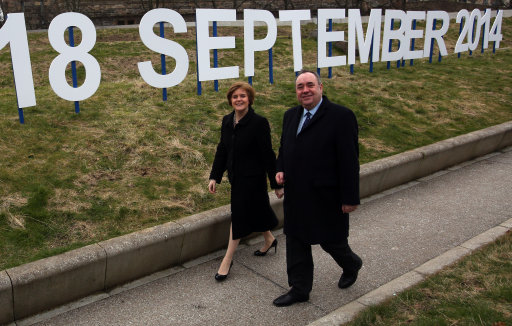Time for a 'conversation shift' in Scotland's referendum debate

Scotland will next year be voting on independence but the Church of Scotland's Sally Foster-Fulton wants the ongoing conversation to move away from a "tennis match of yes and no".
Foster-Fulton, convener of the Kirk's Church and Society Council, said the debate so far had been "quite polarised" and that she wanted to see people talking more about what kind of Scotland they want.
"We are on the cusp of a huge decision but we feel there is a conversation shift that needs to happen, that we need to develop and evolve a safe space for people to think about the kind of Scotland they want regardless of the outcome of the referendum. Let's have a time of visioning and imagining."
She added later: "I would hope that we stop talking about what kind of currency we're going to have and start talking about what we are going to do with that money."
The Church of Scotland is asking the SNPs to publish a draft constitution before asking members of the public to cast their vote on independence.
"If there is going to be a constitution then that draft needs to come to the people so that we know what we are talking about," she said. "It's great to say we're going to have it but until we see it we don't really know what we're talking about and that's not good enough."
Church of Scotland churches will be organising community meetings bringing together people of all faiths and none to discuss the values they want to see characterise Scotland and how the country could become a better place.
The Church has hosted five successful pilot schemes already and is planning to hold dozens of meetings across Scotland in the run-up to the referendum on 18 September 2014. The ideas discussed at the community meetings will be presented to politicians next year.
Fulton-Foster was speaking to reporters ahead of a debate in the Church of Scotland General Assembly on Thursday looking at the implications of independence and the case for future monarchs having a coronation ceremony in Scotland.
"The monarchy will be the King or Queen of the Scottish people, not of Scotland, and I think it would be an incredible celebration of that relationship," she said.
Thursday's agenda will also include a report from the Church and Society Council on Israel stating that the Church of Scotland "does not agree with a premise that scripture offers any peoples a divine right to territory", and that the current situation in Israel and the Occupied Palestinian Territory is "characterised by an inequality in power".
The report concludes that Israel is a recognised state that "has the right to exist in peace and security" and that a Palestinian state should have the same right.
The General Assembly will be debating a revised report after the original sparked serious concerns from the Jewish community in the UK and accusations of anti-Semitism.
Foster-Fulton said the council had removed language from the original report that could have come across as "harsh", although she admitted she "did not expect that level of reaction".
The introduction to the report stresses that the Church of Scotland condemns anti-Semitism and Islamophobia, as well as acts of terrorism, violence and intimidation.
"We are committed to dialogue and conversation," the report states. "We are particularly concerned to make sure that those who are on the margins and whose voices are rarely heard get the opportunity to be listened to. We specifically stand in solidarity with Christians who live in Israel and the Occupied Palestinian Territory."











